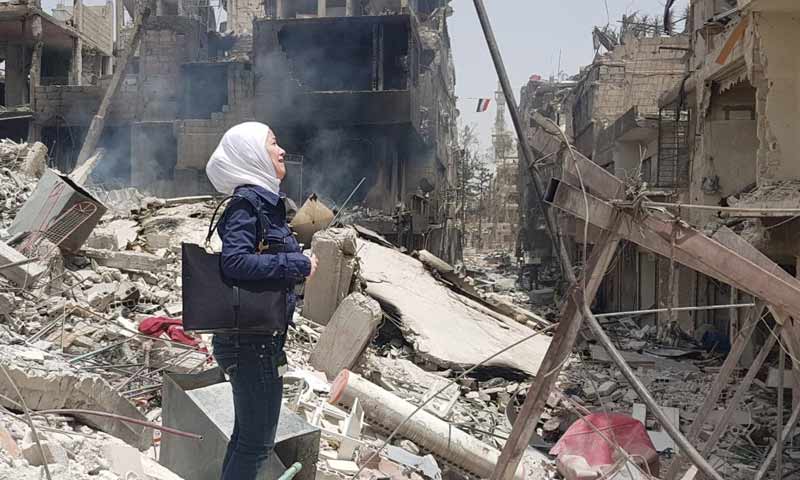



The Palestinian refugee communities in Syria have objected to the Yarmouk Camp’s regulatory plan issued by Damascus governorate two weeks ago.
On 2 July, the “General Authority for Palestinian Arab Refugees” (GAPAR) issued a statement in which it announced the establishment of a committee to object the camp’s urban master plan.
The statement mentioned that the committee’s mission is to “study the details of the Yarmouk Camp’s organizational plan thoroughly and to raise legal objections to it, to protect the rights of Palestinian refugees displaced from the camp, as they are ensured by the laws and decrees of the Syrian government.”
The statement confirmed that the committee would submit its report to the general director within ten days.
The committee includes five people from the GAPAR and its engineering office.
This coincided with a call by the “Action Group for the Palestinians of Syria” (AGPS) to Damascus governorate to abandon the new regulatory plan.
The AGPS said that the Syrian regime’s government dissolved the local committee of the Yarmouk Camp, which was affiliated to Syria’s Ministry of Local Administration since its establishment in 1964, which incorporated the camp into Damascus governorate to be one of its districts.
The camp’s residents view the organizational plan as blatant aggression on their properties of houses, shops, and corporations.
The plan is putting them in front of a new “nakba” disaster, according to the AGPS.
The AGPS confirmed that “the new regulatory plan carries significant changes to the urban reality that prevailed before the Syrian crisis.”
It asserted that “some houses and streets will be removed and their inhabitants would not be able to find them again.”
The AGPS called on Damascus governorate to return to the camp’s organizational plan of 2004, as it safeguarded the houses and properties of Palestinian refugees in Syria.
The “Action Group” considered that any move aiming at depriving the Palestinian refugees in Syria of their rights is considered “suspicious.” It said that any action that would further displace Palestinians, destroy their community structure, or force them to be alienated again has grave implications.
The camp had witnessed battles between the former “Free Syrian Army” (FSA) factions and the regime’s forces, amid the division of the Palestinian factions between the two sides, before the so-called Islamic State (IS) took control of two-thirds of the camp in 2015.
However, the regime’s forces regained full control of al-Hajar al-Aswad and the Yarmouk Camp area in May 2018.
The regime’s control came after a month-long military operation, which led to the expelling of IS from the camp, following an informal evacuation agreement, that forced the transfer of IS militants to the Badia east of As-Suwayda.
Moreover, two years have passed since the regime regained control over the Yarmouk Camp; still, the residents were not allowed to return under the pretext that the rubble removal is not finished yet.
Despite the numerous “return” promises by the regime to the camp residents, Damascus governorate announced two weeks ago its approval of the regulatory plan for the al-Qaboun area and the Yarmouk Camp neighborhood.
On the other hand, the “Yarmouk Camp News Network” published the camp’s new regulatory plan and considered that one of its disadvantages is the expropriation of more than 50 percent of the buildings, houses, and shops included in the new urban planning.
According to the “network,” the Yarmouk Camp’s master plan has other disadvantages, such as the slow implementation of the reconstruction process, which extends to an unknown number of years.
Besides, agencies relevant to the Yarmouk Camp’s reconstruction plan including the Yarmouk Camp Municipality, the United Nations Relief and Works Agency for Palestine Refugees in the Near East (UNRWA), and the UN Refugee Agency (UNHCR) had not been consulted before the issuance of the plan.
if you think the article contain wrong information or you have additional details Send Correction